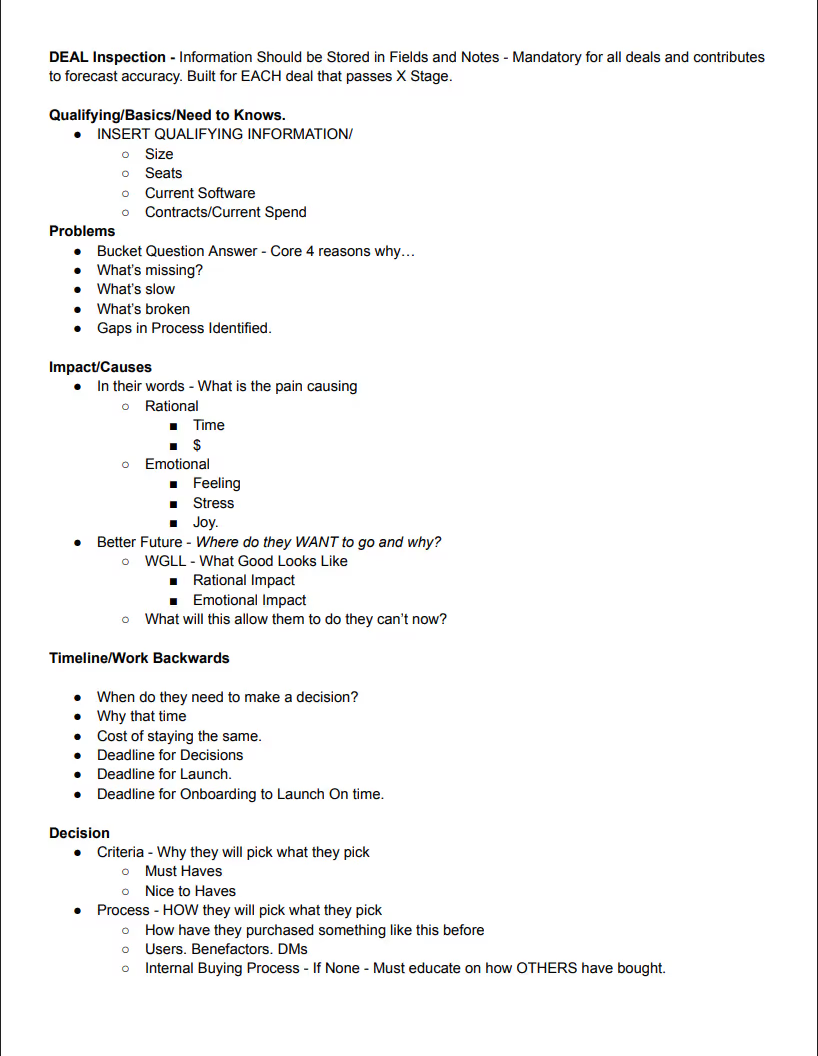Most pipeline reviews absolutely suck. They look like this:
- Rep spends 10 minutes recapping unnecessary deal details
- Manager asks 1-2 useless questions (while multitasking on Slack)
- Both parties waste 30 minutes reviewing 3-5 deals.
Pipeline reviews are not story time. Pipeline reviews are not "bring me up to speed" time.
A good pipeline review involves the minimum amount of recap necessary to find any blindspots... then move onto the next deal.
If you do this right, you should be able to rip through a minimum of 10 deals in 30 minutes and de-risk your most important opportunities with two sets of eyes instead of one.
There are 4 steps to running a pipeline review that doesn't suck:
- Define your sales stages and exit criteria
- Select big deals and strike zone deals
- Reps recap each stage in 1 sentence (and what's next-next)
- Managers ask questions to uncover blindspots
Let's roll.
Step 1: Define your sales stages and exit criteria
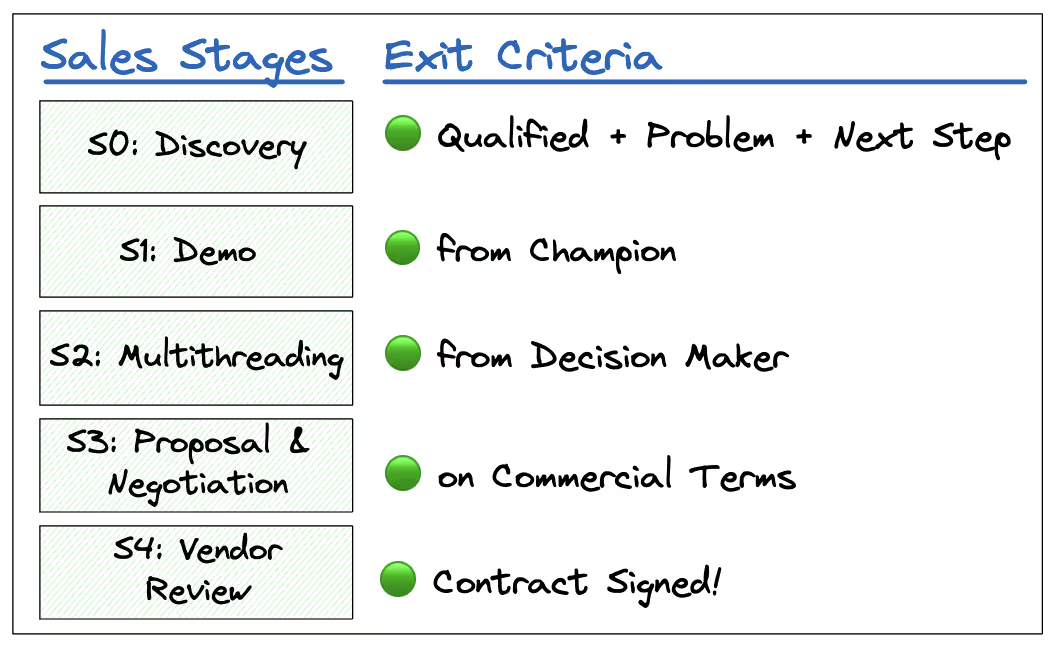
Your sales stages define the major steps in your sales cycle and your exit criteria tells you what it takes to clear each stage.
If you don't have clearly defined stages and exit criteria, your pipeline reviews will involve tons of unnecessary stories and details that don't actually matter to move the deal forward.
For example, these are the 5 common sales stages I use and the exit criteria for each:
---
Stage 0: Discovery/Meeting Set
Exit Criteria: Qualified persona, problem agreement, and next step.
Stage 1: Demo
Exit Criteria: Solution agreement
Stage 2: Multithreading
Exit Criteria: Problem <> solution agreement from POWER.
Stage 3: Proposal and Negotiation
Exit Criteria: Agreement that solving the problem is worth the PRICE.
Stage 4: Vendor Review
Exit Criteria: Completed legal & security, signed contract.
---
This creates a shared language for "what matters in a deal" across your team, which allows you to limit the recap for each stage to a single sentence: how did you achieve the exit criteria for the stage?
But before we start diving into deal recaps, we have to pick the right deals.
Step 2: Select Big Deals and Strike Zone Deals
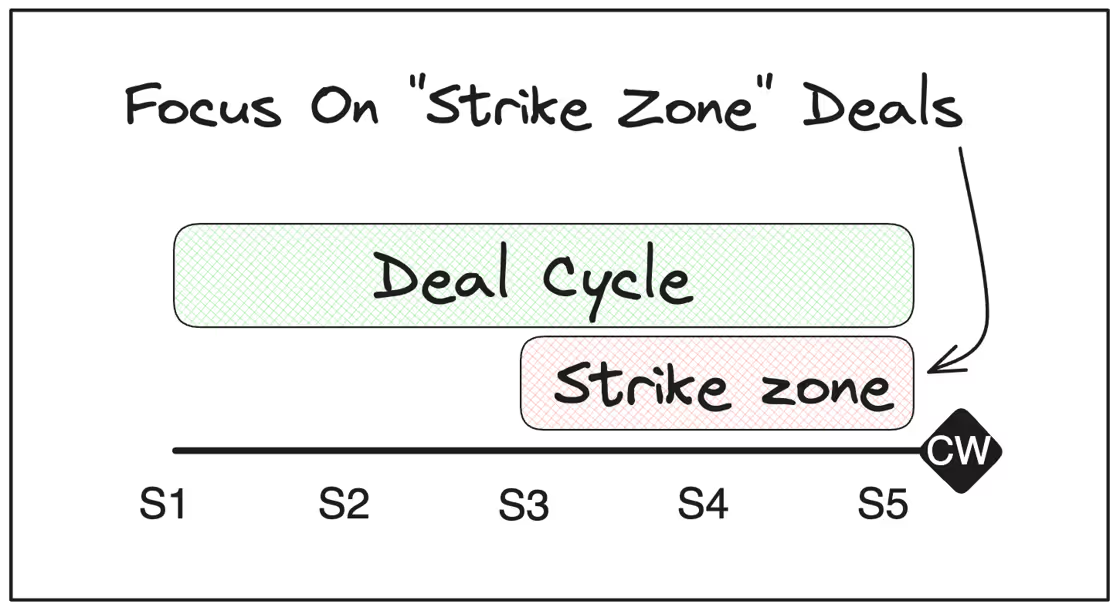
A few weeks ago, the legendary KD taught us how he runs a pipeline review on a live Tactic Teardown.
You can't review every single deal in a rep's pipeline, so here's how KD decides which deals to inspect:
- The biggest deals (whatever $ threshold that means for your business)
- The strike zone deals
He defined the "strike zone" as the key area where deals are won or lost.
For example, when I was at Pave, the critical moment for a deal was when we got to present to the Chief People Officer. If that meeting didn't go well, we had a drastically lower chance at winning the deal.
That means my "strike zone" began at the Multithreading stage and I would place a disproportionate amount of focus on those deals first.
Between the big deals and the strike zone deals, you should have a minimum of 10 to cover in a 30 minute pipeline review -- which means you're ready to dive in.
Step 3: Reps Recap Each Stage in 1 Sentence (And What's Next-Next)
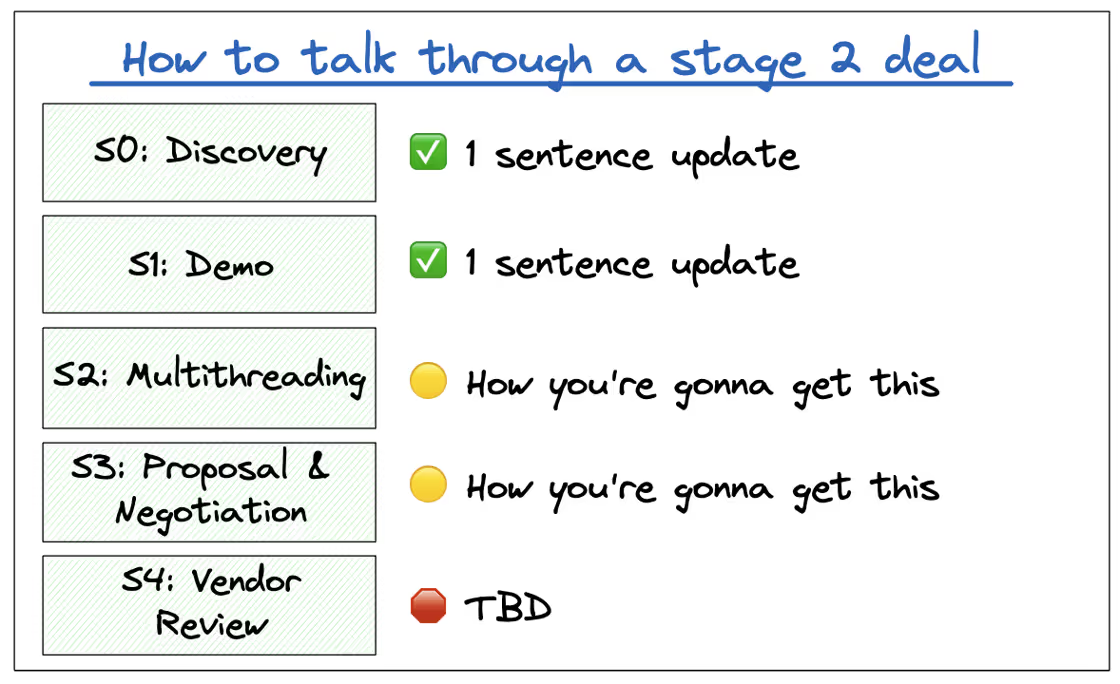
This is where that exit criteria is going to come in handy. The rep needs to recap the following for deal in the pipeline review in one sentence per stage:
- For Past Stages: How did they achieve the exit criteria?
- For Future Stages: How do they plan to get the exit criteria for the next TWO stages (aka: next-next)?
Here's an example of how that should sound for a deal entering stage 3:
- 🟢 Discovery: The Director of Compensation agreed that they multiple employees leave the company who didn't realize how much equity they were leaving on the table.
- 🟢 Demo: The Director of Compensation saw the Total Rewards platform and said that it was exactly what she would've wanted to show to those employees.
- 🟡 Multithreading: The next step is we need to win over the Chief People Officer so I have a pre-prep call with my champion to understand what's important to her.
- 🟡 Proposal: If that goes well, we'll need to build a business case to get finance approval because this was not a pre-planned expense, but this is how they've gotten net new spend approved in the past.
- 🛑 Vendor Review: n/a (two stages out)
When we'd do weekly team deal reviews, I'd play the one sentence game with my team where you only got one sentence per stage as a forcing function to cut out all of the unnecessary stories and details that didn't matter.
If your reps do it right... the review of this deal might actually end RIGHT HERE.
Your goal in a pipeline review is for your reps to catch the blindspots first, which is why you give them a chance to dive into the next-next exit criteria.
But if something smells funny, that's when the leader dives in.
Step 4: Managers Ask Questions to Uncover Blindspots
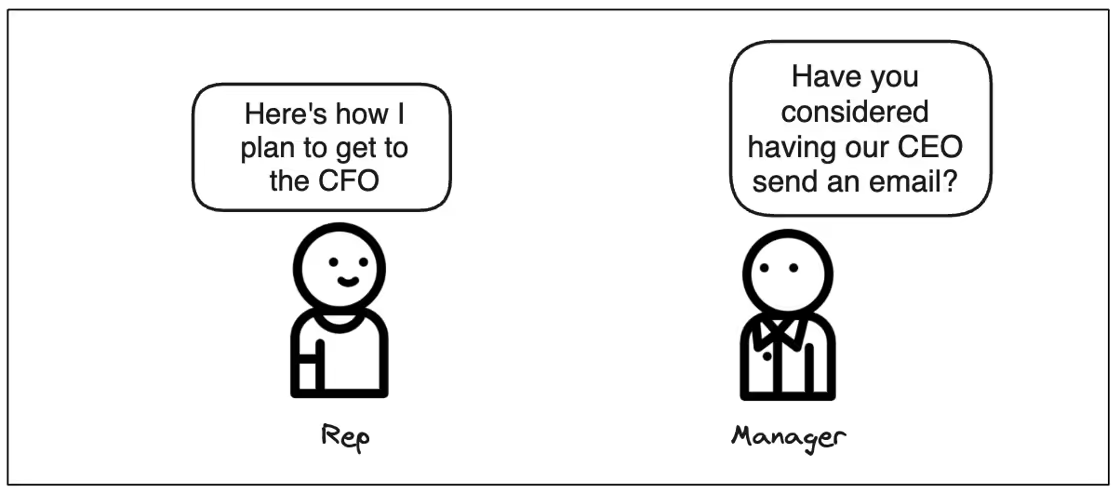
A lot of new managers will ask me: what are the best questions to ask in a pipe review?
Honestly, this isn't like discovery where you need to come up with all of these fancy ways to ask questions to reveal a hidden problem.
I ask two types of questions in pipeline review:
- For Past Stages: Is there risk in the way that they achieved the exit criteria?
- For Future Stages: is there risk in the plan to get the next exit criteria?
Using that example from earlier, here are questions I might ask:
- 🟢 Discovery: I know the Director of Compensation mentioned multiple employees left because they didn't understand their equity... but what % of overall employee churn was that relative to every other reason people quit?
- 🟢 Demo: They said it was exactly what they wanted to see, but is there a way for them to do this on their own or with another competitor.
- 🟡 Multithreading: To what extent have you figured out if this is a problem that power even cares about?
- 🟡 Proposal: What are the types of things they've gotten approved in the past? What hasn't gotten approved?
- 🛑 Vendor Review: (n/a, but if I were to ask a question, it might be) How long has it taken them to finish legal & security when buying other HR Tech?
My goal is not to put my rep in the hot seat. I'm the rollercoaster attendant who pulls on all of the seatbelts to double check that they're not going to fly out of their seat.
The end goal is for a pipeline review to become boring and predictable where you your rep shares their plan and you say... "you know exactly what you're doing."



